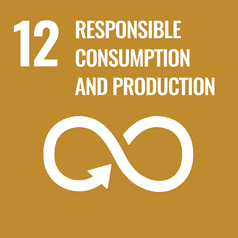

Goal 12:
Responsible Consumption and Production
Ethical Sourcing Policy
The University of Newcastle incorporates ethical, social, environmental, and supplier‑responsibility criteria into our procurement and supply policies. These criteria are embedded in the Procurement Policy (notably in Sections 1, 6, and 7, including Clauses 15, 16 & 17), as well as in related documents such as the Supplier Code of Conduct, Ethical Framework, and Indigenous Procurement Strategy.
Below is how that policy is structured and how it is applied, including examples and developments as of 2024.
Procurement Policy & Related Instruments
Procurement Policy
The University’s Procurement Policy is the primary document dealing with how the University acquires goods, services and supplies.
- Section 1 – Introduction
The policy states that one of its strategic priorities is “Sustainability: the University is ethically minded and prioritises responsible management of its environmental, social and financial impact.” - Section 6 – Authority and Compliance
The policy mandates that procurement must comply with “the Key Procurement Principles” and “give due consideration to the Ethical Framework” among other compliance requirements. - Section 7 – Procurement Principles
Clauses 15, 16, and 17, specifically, integrate non‑cost factors and ethical sourcing into evaluation criteria. For example:- Clause 15 requires that potential suppliers be evaluated not only on cost but also on “source of supply; impact on society; approach to environmental sustainability; legal compliance”.
- Clause 16 states that, “In assessing value for money, the University has a responsibility to ensure that its procurement activities also consider relevant social, gender, community, and environmental issues. Provided that all other Key Procurement Principles are met, and where practical, the following will be favoured by the University:
- products containing materials that are produced and distributed in a sustainable and ethical manner;
- locally sourced goods and services;
- carbon neutral goods and services;
- suppliers that minimise their energy consumption and adverse environmental impact;
- suppliers with end-of-life product stewardship programs;
- business practices that support the global fair trade movement and do not constitute modern slavery
- procurement that supports the participation of Aboriginal and Torres Strait Islander businesses
- suppliers who have a strong overall track record in environmental and social sustainability.”
- Clause 17 emphasises open and fair competition but in doing so ensures the procurement process is transparent, fair, and allows for equitable participation by suppliers without undue advantage to any party.
This policy was effective from the 15th of September 2023 and was reviewed in March 2025.
Other supporting instruments
- Supplier Code of Conduct & Sustainability / ESG integration
On the University website under Investment and procurement, the University states that we maintain a Supplier Code of Conduct which sets minimum standards of doing business with the University. This includes requiring suppliers to comply with ethics, labour rights, environmental practices, and to actively assess and manage their own supply chains.
The University has also publicly declared, in its sustainability goals, that we seek to integrate environmental, social and governance (ESG) principles into procurement practices. - Indigenous Procurement / Aboriginal and Torres Strait Islander Procurement Strategy
The University explicitly has a strategy to engage Indigenous businesses, offering preferential terms (such as raising the single-quote threshold and faster payment terms) to support their inclusion in supply to the University. - Ethical Framework
The University’s Ethical Framework guides decision making generally across University operations, and procurement is required to have regard to that framework.
How this works in practice (2024)
Practical application
Because the Procurement Policy stipulates that non‑cost criteria are considered and that ethical and sustainability factors be given weight “where practical”, in real procurement processes the University can – and does – require suppliers of food, supplies, or services to meet certain standards (for example, in environmental impact, labour standards, supply chain transparency).
For example:
- When a tender is issued for catering, cleaning, or services involving consumables, the procurement plan may specify that suppliers must demonstrate ethical sourcing (e.g., fair trade certification, use of local producers, environmental credentials).
- Suppliers may be required to commit to the Supplier Code of Conduct and to allow auditing or reporting of their practices.
- Preference is given (all else equal) to suppliers who minimise their carbon footprint, use sustainable packaging, or adhere to fair labour standards, especially in contracts with larger value or risk.
2024 updates
- The University’s Procurement Policy has been updated as recently as 14 February 2024 (a division name changed in the legal & compliance structure) and also in 2023 to reflect improved panel use.
- The policy’s core ethics / sustainability provisions remain in place in its current version.
- The University continues to list sustainability, ethical sourcing, and social responsibility among strategic priorities in procurement.
- The University’s public commitments show that we see supplier ethics, environmental sustainability, and inclusion (Indigenous procurement) as ongoing responsibilities—not just aspirational statements from earlier years.
Strategic priorities
The University’s procurement processes are governed by the Procurement Policy and informed by the following strategic priorities:
| Equity | The University supports the fair and equitable treatment of its suppliers throughout its supply chain via activity that incorporates social, human rights, and environmental considerations into how the University and its supply chain do business across the world. |
|---|---|
| Excellence | The University is publicly accountable for the use of its funds and strives to ensure value for money is achieved through procurement to support exceptional outcomes for its students, staff, and communities. |
| Engagement | The University is committed to using its resources to engage and support businesses owned and managed by Aboriginal and Torres Strait Islander peoples, visible minorities, local businesses, and other underrepresented groups. |
| Sustainability | The University is ethically minded and prioritises responsible management of our environmental and financial resources. |
What does the University of Newcastle buy?
The University of Newcastle procures a diverse range of goods and services with procurement related spend in excess of approximately $350 million per year.
Procurement Categories
- Cleaning Services
- Landscaping and Grounds Maintenance
- Security Services and Systems
- Waste Management
- Mechanical Services
- Fire Services
- Plant and Equipment
- Professional Services and Consultancy
- Project Management
- Trade Services
- Head Contractors
- Leasing
- Gas and Electricity
- Renewables
- Parking
- Furniture and Fittings
- Financial Services and Consultancy
- Governance and Insurance Services
- Legal Services
- Human Resources Services
- Health and Safety
- Employee Assistance
- Logistics
- Travel, Transport and Accommodation
- Fleet
- Storage
- Marketing, Advertising and Media
- Events management and promotions
- Catering
- Office Supplies
- Staff Uniforms
- Hardware
- Software
- Printing
- Networks
- Mobile Devices
- Telecommunications
- Professional Services and Consultancy
- Data Storage
- Cloud Infrastructure
- Maintenance and Support Services
- Laboratory Materials
- Research Equipment and Supplies
- Laboratory Gases and Supplies
- Teaching Equipment and Supplies
- Library Material and Subscriptions
The University of Newcastle acknowledges the traditional custodians of the lands within our footprint areas: Awabakal, Darkinjung, Biripai, Worimi, Wonnarua, and Eora Nations. We also pay respect to the wisdom of our Elders past and present.